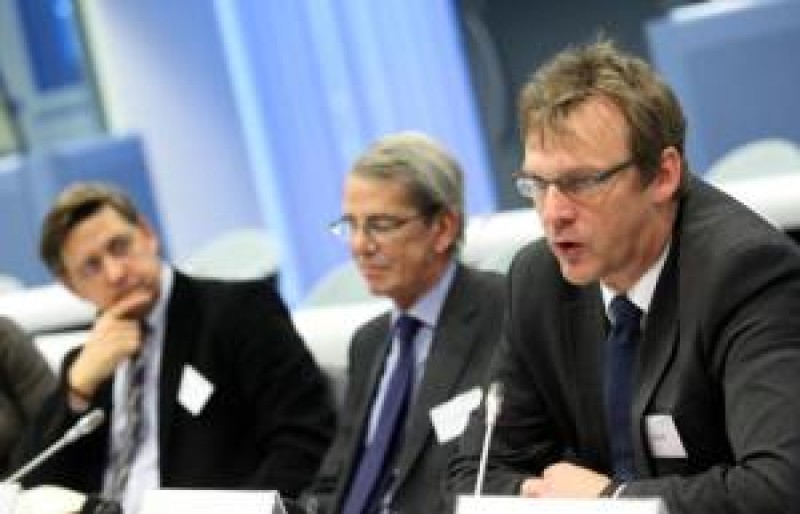Jointly issued with the Commission of Bishops' Conferences in the European Community (COMECE)
This was the topic of the Dialogue seminar organised by CEC and COMECE together with the Bureau of Policy Advisers of the European Commission, on 14 December 2012 in Brussels.
The term "social market economy" entered the EU treaties, along with other objectives, via the Treaty of Lisbon. The model of the social market economy thus became one of the major objectives of the Union. The comprehensive realisation of this objective, however, is still to be achieved. But what are the foundations of this economic model? How can we Europeanise it? The current crisis in the Eurozone, and the structural weaknesses and imbalances in the European Union as a whole, underlines the urgent need for this debate.
Opening the Session, Bishop Ambrosio, COMECE Vice-President, emphasised that the notion of a social market economy is a key to getting citizens to find trust again in the European project. "It is also necessary to value more the meaning of free and gratuitous action not only in the context of economic activities but also in social and political life" he added.
Prof. Dr. Heinrich Bedford-Strohm, Bishop of the Evangelical-Lutheran Church in Bavaria highlighted that “the success of the social market economy is especially due to the fact that social responsibility is an integrated element of the economic process and does not come simply as a next step after economic prosperity. The critical challenge of a social market economy today is to address climate change, which affects especially the poor countries in the South.”
In a second session, church experts from different Member States were invited to assess the convergence of social market economy in Europe.
From Poland, Dr. Sarnacki SJ suggested that the social market economy demands a rationally-orientated economy, rooted in social trust reinforced by a social contract. The ideal is to balance economic productivity with social responsibility. "This implies transparency, a fair and satisfactory legal system, as well as the implementation of the rules of solidarity and participation. This model is not being realized in the actual situation" he concluded.
Prof. Dr. Heikki Hiilamo reported the experience of Finland which was affected by a crucial economic depression in the 90’s. Since this experience the churches are contributing to the public efforts to address poverty and social exclusion, complementing the social services of the State. Therefore he called on the European Commission “to open the European funding programmes more than it does today to church actors.”
The third session was dedicated to Youth Unemployment as an imminent challenge across the EU.. Different Church organisations presented their successful projects to fight youth unemployment: The Inclusion of Young Workers by Cáritas Diocesana Segorbe Castellón (Spain), the "One in a million campaign" launched by the Youth Trust in Birmingham (United Kingdom), the QuiK-Service, a qualification initiative launched by the Kolping Akademie in Ingolstadt, (Germany) and an initiative of the Church of Greece near by Piraeus.
Finally, it is not enough that the concept of a ‘European social market economy’ has been enshrined in the EU Treaties since 2009. The Churches and Church organisations recall the need to spread this concept across Europe, so that the EU Member States may survive the challenge of global competition, and in order to be able to continue offering the most vulnerable in our midst effective social protection; as well as to be sustainable, given the requirements of environmental and climatic protection.
***************
The Conference of European Churches (CEC) is a fellowship of some 120 Orthodox, Protestant, Anglican and Old Catholic Churches from all countries of Europe, plus 40 associated organisations. CEC was founded in 1959. It has offices in Geneva, Brussels and Strasbourg.
The Church and Society Commission of CEC provides a platform for the CEC membership to reflect on socio-ethical issues ecumenically and to involve them in common action and advocacy in relation to the European Union, the Council of Europe, the North Atlantic Treaty Organisation, the Organisation for Security and Co-operation in Europe and the United Nations (in European matters). CSC operates as a forum for action, dialogue and ecumenical training in European affairs.
For more information please contact:
Mag. Elizabeta Kitanovic
Church and Society Commission of CEC
Rue Joseph II, 174
B-1000 Bruxelles
Tel. +32 2 230 17 32
Fax +32 2 231 14 13
E-Mail: eki@cec-kek.be
